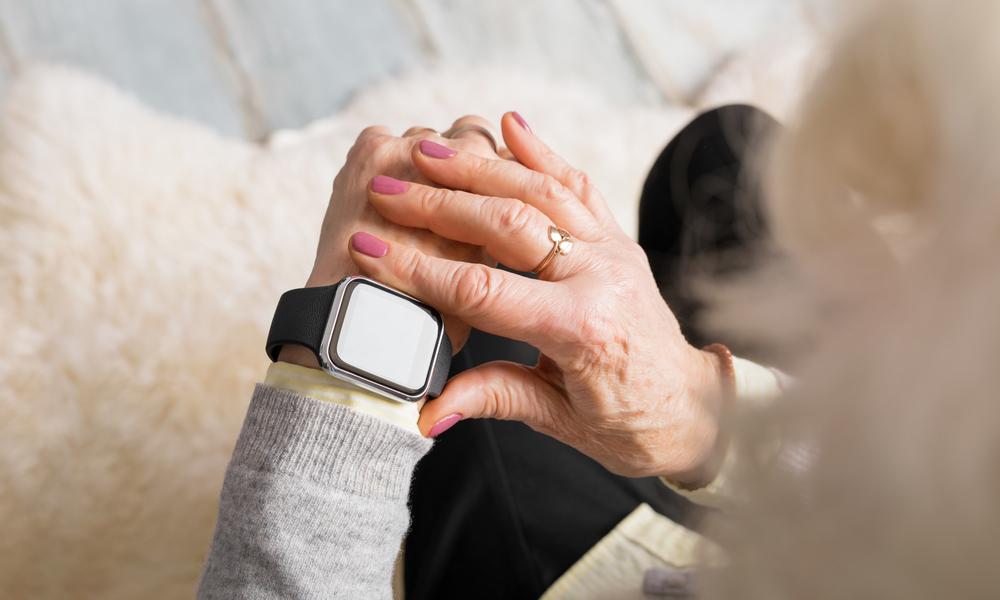Your Apple Watch Could Soon Detect Early Signs of Dementia
 Credit: Kaspars Grinvalds / Shutterstock
Credit: Kaspars Grinvalds / Shutterstock
Toggle Dark Mode
One of the things that’s made the Apple Watch insanely popular among high-tech wearables is Apple’s very strong focus on not just fitness, but also actual, tangible diagnostic and health monitoring features. While many wearable devices will tell you how many steps you’ve taken or even monitor your basic heart rate and calorie burn, the Apple Watch is the only one that can explicitly detect certain heart conditions, perform basic electrocardiograms, and even detect falls and call emergency services for you. As many well-documented stories have shown, the Apple Watch quite literally saves lives.
Apple still wants to do more, however, and has continued partnering with medical researchers to explore new ways in which its wearable device could help further contribute to quality of life and early detection of various medical conditions. For example, last year a new ResearchKit feature added the ability for the Apple Watch to detect symptoms of Parkinson’s disease, and now CNBC reports on another new angle that most people probably hadn’t even considered — detecting early signs of dementia, such as Alzheimer’s disease.
Early Detection is a Big Challenge
More than six million people in the U.S. live with some form of dementia, yet it’s often very difficult to detect the early symptoms of such conditions, leaving many cases undiagnosed until they become much more serious.
As a result, researchers have been searching for years to try and find more reliable ways to identify those with mild cognitive impairments that could be signs of early onset Alzheimer’s disease and other similar conditions, and Apple has now joined this pursuit in a new partnership with pharmaceutical company Eli Lilly and health-tech start-up Evidation.
In this case, a new research study titled Developing Measures of Cognitive Impairment in the Real World from Consumer-Grade Multimodal Sensor Streams is taking a slightly different approach from past attempts, looking at using the Apple Watch and other electronic devices such as iPhones and Beddit sleep monitors to analyze “everyday behavioural data.” The goal in this case is to see how this data could help to differentiate between users with mild cognitive impairments and those without symptoms.
With this research, we looked at how everyday behavior data, such as those captured by iPhones, Apple Watches, and Beddit sleep monitors, may be effective in differentiating between individuals with mild cognitive impairment and early Alzheimer’s disease, and those without symptoms.
Christine Lemke, co-founder of Evidation, speaking with CNBC
The results of the initial 12-week study, which involved 113 participants, will be discussed this week at the KDD conference in Alaska, which focuses on data science, data mining, and knowledge discovery across a variety of disciplines. Apple, Eli Lilly, and Evidation each provided five researchers to the study, making it an equal collaboration between the three companies.
More Analysis is Needed
The most recent study is just a first step, however, and while researchers emphasize that much more analysis is needed, the findings so far have been promising. Over the course of 12 weeks, 113 participants were provided with an iPhone, an Apple Watch, and a Beddit sleep tracker, and asked to avoid taking medication that might impact the results. Of the 113 individuals who participated, 82 were part of a healthy control group while the other 31 had already been identified with varying stages of cognitive decline and dementia.
The researchers found that those with known symptoms of cognitive decline showed notable behavioural changes, such as typing more slowly, typing less regularly, and sending fewer text messages. They also showed a greater reliance on support apps and were less inclined to fill out surveys. However, the researchers cautioned that it’s not yet possible to draw out any long-term conclusions, and more research is needed.
There’s also the question of what can be done with the results, since there’s little that can be done to stop the decline once early stage dementia begins, and presenting results to patients could risk increasing anxiety, which would be unlikely to help their condition.
Still, it’s another encouraging attempt to use consumer technology in ways that will hopefully help to improve quality of life for many people, and another sign that Apple is extremely serious about making its mark in the health industry.






